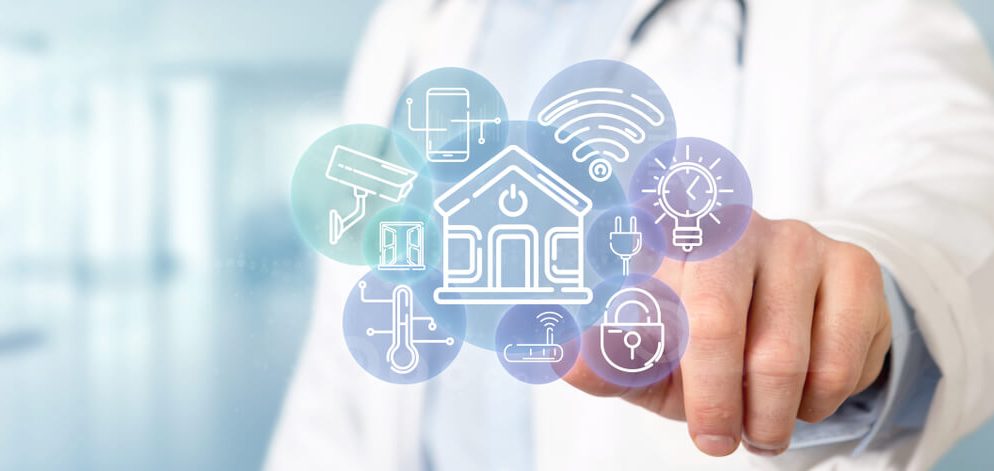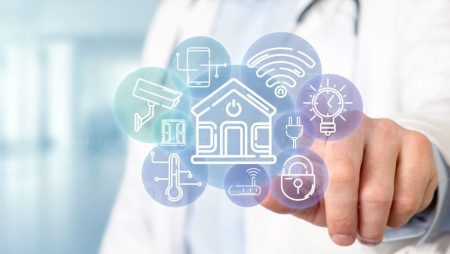



Get new exclusive access to healthcare business reports & breaking news




The smart home healthcare market value is set to reach USD 172 billion by 2032, according to the latest research report by Global Market Insights Inc. The smart home healthcare industry is anticipated to register 28.5% CAGR between 2023 and 2032 owing to growing popularity of Internet-of-Things (IoT) in home healthcare.
The technological evolution and development of healthcare and fitness gadgets are favorably influencing industry progress. End users are increasingly adopting technologically advanced equipment. These user-friendly gadgets allow patients to track their calorie intake, heart rate, and the number of calories burned. Furthermore, smart home healthcare products, such as wearables, feature alarm systems that detect fires and falls and allow the user to summon help. Such favorable features are expected to boost product demand.
Among the biggest names in the wearable business, one can find major companies such as Apple Inc., Zanthion, Companion Medical, Hoffmann-La Roche Ltd., VitalConnect, General Electric Lighting, Google (Alphabet Inc.), Health Care Originals, Hocoma AG, Medtronic, Sanofi SA, SAMSUNG Electronics. These significant industry leaders are investing in the development of novel technologies and products to gain a competitive edge in the market.
From noninvasive glucose monitoring to smart treadmills or health-measuring bathmats, the health gadgets became increasingly popular, and impressive brands can be found on the best health tech list.
Smart home healthcare market from wireless segment was worth over USD 7.5 billion in 2022. The advantages of wireless technology over wired technology, the ease of connection, and sensors that are embedded into computing devices, are largely contributing to segment expansion. This technology can readily undertake long-term health trend analysis and produce alarm signals in emergency situations, which is set to increase its adoption.
High-quality sensors and great connectivity improve healthcare wearable devices and make them easier to use. Heart monitors, for instance, have made huge milestones and strides from the heavy, klutzy and uncomfortably cold devices that you’d have to strap to your chest. Today, they are stylish, small, packed with cutting-edge features, and can do much more than monitor your heart rate.
Like most modern fitness trackers, these nifty health tech gadgets put a great deal of knowledge in your hands. Most of them record heart data, which then can be shared with one’s doctor, nutritionist or instructor.
Smart home healthcare market from installation and repair service segment captured around 65% business share in 2022. The segment is expected to expand significantly throughout the projected period due to the growing use of various modern devices that are installed to identify abnormalities and behavioral patterns in the patient’s health. Moreover, the availability of various residential service platforms to facilitate installation in an individual’s home gateway is likely to accelerate industry trends.
Smart home healthcare market share from the nutrition or diet monitoring segment was valued at more than USD 2 billion in 2022. The segment is poised to develop considerably in the coming years as people become more aware of the importance of nutrition and diet monitoring. Diet monitoring raises awareness for a healthy lifestyle and keeps individuals accountable, which is slated to complement segment growth.
Smart home healthcare market in Europe is estimated to exceed USD 52.5 billion by 2032. The rising prevalence of chronic illnesses, injuries, accidents, and obesity, coupled with a growing population base embracing sedentary lifestyles, is expected to drive the business landscape. Consumers are interested in smart home healthcare because the technology provides various opportunities for patient empowerment and control, as well as lower healthcare costs in a variety of situations, all these being valid reasons for the industry’s expansion.
Of course, research and funding make new breakthroughs possible. For instance, French startup FeetMe has landed €9.4 million ($10.3 million) in Series A funding for its wearable technology that tracks gait and posture. The company takes multiple approaches to learn more about a user’s gait – locomotion achieved through the movement of human limbs. The device was designed in the hope of improving the mobility of those undergoing rehab and can even be used to monitor disorders associated with disease including multiple sclerosis, diabetic foot problems, and Parkinson’s disease. All FeetMe wearables collect data in real-time, which allows the evaluation app to create real-time gait parameter visualizations. Physicians can also access this data in real-time, which enables them to follow their patients’ progress.
Real-time technology is becoming more prominent in the market in recent years. In 2019, Northwestern Medicine launched an app allowing parents of children in ICUs to track their child’s progress overnight.
Global Market Insights Inc., headquartered in Delaware, U.S., is a global market research and consulting service provider, offering syndicated and custom research reports along with growth consulting services. Our business intelligence and industry research reports offer clients with penetrative insights and actionable market data specially designed and presented to aid strategic decision making. These exhaustive reports are designed via a proprietary research methodology and are available for key industries such as chemicals, advanced materials, technology, renewable energy, and biotechnology.